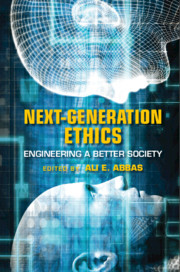Book contents
- Next-Generation Ethics
- Next-Generation Ethics
- Copyright page
- Contents
- Contributors
- Acknowledgment
- 1 Next-Generation Ethics
- 2 Ethical Distinctions for Building Your Ethical Code
- Part I Technology
- Part II Business Enterprises
- Part III Engineering
- Part IV Society
- 21 Topics in Next-Generation Ethics
- 22 Techno Innovations: The Role of Ethical Standards, Law and Regulation, and the Public Interest
- 23 Evolutionary Ethics: A Potentially Helpful Framework in Engineering a Better Society
- 24 Topics in Next-Generation Medical Ethics
- 25 Next-Generation Ethical Development of Medical Devices
- 26 Looking Back to Go Forward: The Ethics of Journalism in a Social Media Age
- 27 Social Media Ethics 2.0
- 28 Artificial Intelligence, People, and Society
- 29 Ethics in Cyberspace: Freedom, Rights, and Cybersecurity
- 30 Next-Generation Religion and Ethics
- Index
- References
21 - Topics in Next-Generation Ethics
Public Policy, Medicine, Business, and Engineering
from Part IV - Society
Published online by Cambridge University Press: 18 October 2019
- Next-Generation Ethics
- Next-Generation Ethics
- Copyright page
- Contents
- Contributors
- Acknowledgment
- 1 Next-Generation Ethics
- 2 Ethical Distinctions for Building Your Ethical Code
- Part I Technology
- Part II Business Enterprises
- Part III Engineering
- Part IV Society
- 21 Topics in Next-Generation Ethics
- 22 Techno Innovations: The Role of Ethical Standards, Law and Regulation, and the Public Interest
- 23 Evolutionary Ethics: A Potentially Helpful Framework in Engineering a Better Society
- 24 Topics in Next-Generation Medical Ethics
- 25 Next-Generation Ethical Development of Medical Devices
- 26 Looking Back to Go Forward: The Ethics of Journalism in a Social Media Age
- 27 Social Media Ethics 2.0
- 28 Artificial Intelligence, People, and Society
- 29 Ethics in Cyberspace: Freedom, Rights, and Cybersecurity
- 30 Next-Generation Religion and Ethics
- Index
- References
Summary
This chapter presents reflections on next-generation ethical issues by four deans at the University of Southern California: Public Policy, Medicine, Business, and Engineering. Each of the deans was asked to reflect on some of the important ethical issues that they believe we face today or that we will face in the near future. Their responses follow.
- Type
- Chapter
- Information
- Next-Generation EthicsEngineering a Better Society, pp. 315 - 327Publisher: Cambridge University PressPrint publication year: 2019



